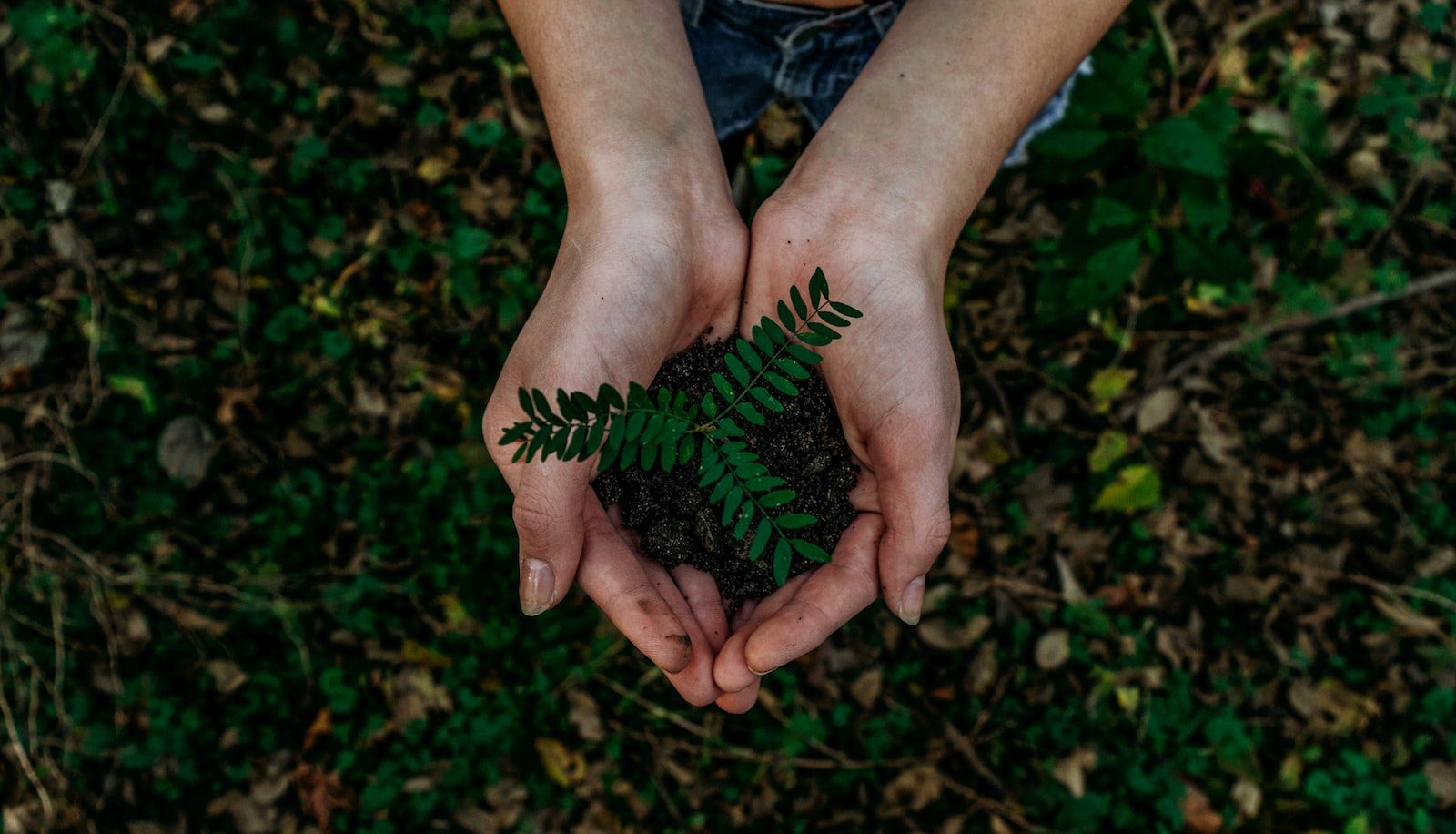This post contains what may be the most important zero-waste knowledge. Why? Because composting is the single most impactful zero waste habit you can adopt to reduce your emissions.
Composting food scraps, yard clippings, and other organic materials is a way of controlling decomposition so that instead of emitting harmful gasses, the result is a rich soil that can be used in plant beds. Browse through these frequently-asked questions below to get your gears turning (or should I say, “get your organic material decomposing?“) about incorporating composting into your zero-waste life.
What is composting?
“Composting” is the process by which you control the decomposition of organic materials (food scraps, yard waste, etc.) to create a usable, healthy fertilizer called “compost”.
“Compost” is an organic material that can be added to soil to help plants grow, helping to boost and sustain food production in the future.
Composting involves collecting your organic scraps and mixing them with dead leaves, twigs or sawdust in a moist environment. Over time and under the proper conditions, the decaying organic material turns into a rich, dark fertilizer that you can spread on plants to help them grow.
Why should I compost?
- Composting is the quickest way to have a huge impact on waste.
- More than 30% of what Americans throw away is made up of compostable materials.
- Organic materials (especially food scraps) that end up in a landfill are forced to decompose without enough oxygen. This emits methane, a greenhouse gas that is more than 30 times more powerful than CO2.
- Organic materials in landfills represent both an enormous cost in greenhouse gasses emitted into the atmosphere, and also an enormous opportunity cost in the production of “compost”, the rich fertilizer that organic matter becomes if decomposed under the proper conditions. “Unlike landfilling, composting organic material helps plants and microorganisms to grow and actually pulls carbon out of the atmosphere. One model found that applying compost to 50 percent of California’s land used for grazing could sequester the amount of carbon currently emitted by California’s homes and businesses.”
What can I put in the compost?
The EPA gives the following list of materials that can be composted in a backyard compost:
- Fruits and vegetables
- Eggshells
- Coffee grounds and filters
- Tea bags
- Nut shells
- Shredded newspaper
- Cardboard
- Paper
- Yard trimmings
- Grass clippings
- Houseplants
- Hay and straw
- Leaves
- Sawdust
- Wood chips
- Cotton and Wool Rags
- Hair and fur
- Fireplace ashes
What can I not put in the compost?
The EPA gives the following suggestions about materials that may not compost well:
- Black walnut tree leaves or twigs
- Releases substances that might be harmful to plants
- Coal or charcoal ash
- Might contain substances harmful to plants
- Dairy products (e.g., butter, milk, sour cream, yogurt) and eggs*
- Create odor problems and attract pests such as rodents and flies
- Diseased or insect-ridden plants
- Diseases or insects might survive and be transferred back to other plants
- Fats, grease, lard, or oils*
- Create odor problems and attract pests such as rodents and flies
- Meat or fish bones and scraps*
- Create odor problems and attract pests such as rodents and flies
- Pet wastes (e.g., dog or cat feces, soiled cat litter)*
- Might contain parasites, bacteria, germs, pathogens, and viruses harmful to humans
- Yard trimmings treated with chemical pesticides
- Might kill beneficial composting organisms
*Check with your local composting or recycling coordinator to see if these organics are accepted by your community curbside or drop-off composting program.
How can I use my compost?
Once the material in your compost pile is dark and crumbly, you can spread it over your garden or potted plants as you would any store-bought fertilizer.
How can I set up composting…
…in my yard?
- You can set up a compost pile in a shady spot in your yard, optionally covered with a tarp.
- Many people may decide to purchase compost bins, which can hold your compost in a single spot instead of a potentially messy pile.
- To compost in your yard, you need a source of dry organic material such as dead leaves, hay, or twigs, often referred to as “brown material”. Add fresh scraps from your kitchen and garden (called “green material”) to your compost bin/pile alternately with the brown material, watering the pile between each layerl: one layer of green, one layer of brown, water, repeat.
- To make your compost decompose faster, you can aerate the compost by turning it. Some compost bins have mechanisms for aerating the compost inside. If you have a pile, you can aerate by stirring up the compost with a gardening tool.
- Monitor the temperature of your compost: if your compost is successfully composting, a thermometer inserted into the middle of your compost pile should read 120-160 degrees Fahrenheit (about 49-71 degrees Celsius).
…in my apartment or condo?
- It is possible to set up an indoor composting system using a small composting container, or even a cardboard box.
- set up an indoor composting system such as a vermicompost
- see if you can engage other tenants in your building/complex
- If you live in an apartment or condo and want to compost but don’t have the space for your own composting system, you also could explore curbside pickup or community composting programs.
…in my community?
- find your local community compost, which may be at a park, school, or community garden.
- drop off your compost at your local community compost
- volunteer at your local community compost
…via a composting service?
- some places offer curbside pick-up of compostable waste, similar to trash and recycling pick-up. Other cities may offer a central compost drop-off location.
…for free?
There’s no need to buy an expensive compost bin or a fancy food scraps container. In fact, composting can be a very economical choice.
- Take advantage of local community compost (see above)
- Use a cardboard box
…at my workplace or school?
Perhaps you already have established an excellent composting system at home and you are ready to level-up and spread the practice of composting to more people in your life.
Can I compost indoors?
It is possible to set up a composting system on a balcony or in a mud room or kitchen cabinet (or anywhere else you have space).
Can I compost without a compost bin?
How can I keep my compost from smelling?
In between drop-offs, you can freeze your compost or keep it in a container on your counter and as long as you have a good lid, it won’t stink up your place.
- smelly compost is healthy compost; smell doesn’t mean dirty or bad
- freeze
- tight lid
- empty regularly
How can I improve the quality of my compost?
- Make sure your compost is getting enough brown material if you’re planning on using it for soil.
- If your compost starts to have an ammonia smell, try adding more brown material.
- If your compost is not getting warm enough, try adding more green material.
What are some examples of successful composting programs?
Thanks to strong composting and recycling programs, San Francisco has reduced the amount of trash it sends to landfills by 80 percent and composts 255,500 tons of organic material each year. The state of Vermont passed a Universal Recycling Law in 2012 and is phasing in policies and programs until all of its recyclables, leaf and yard debris, food scraps and other organics will be banned from landfills in 2020.
Portland, Oregon, picks up organic waste more frequently than trash, encouraging residents and businesses to put their organics into the compost bin for quicker service.
Requiring large, commercial producers of organic waste to compost can divert a large percentage of organic waste away from landfills and incinerators, and does not require resources from the city. Some communities have also used such a requirement to help build up their composting capacity and infrastructure in order to gradually phase in a city-wide program. New York became the sixth state to pass such a requirement in March, 2019.
In the United States:
- San Francisco, CA
- Vermont
- Portland, OR
- New York & 5 other states
What is a vermicompost?
Vermicomposting uses earthworms to aid in the decomposition or organic materials to create a nutrient-rich soil amendment. You can learn more about it here.
How can I make my compost decompose faster?
Keeping your compost at room temperature will save you a ton of space because it will start to decompose and shrink down. You can even use scissors and give your compost a rough chop to make it decompose even faster!
How does compost compare to chemical fertilizers?
Compost can replace synthetic chemical fertilizers. Not only does compost create rich, healthy soil in which plants can thrive, it does not include the many harmful effects of chemical fertilizers, which may produce nitrous oxide (a very potent greenhouse gas) or pollute nearby water ways. Moreover, synthetic fertilizers have been found to diminish soil quality over the long term. Compost is a renewable, natural resource that enriches the soil without the harmful effects of other fertilizers.
What do I need to add to my compost?
A compost pile needs three ingredients: brown material, green material, and water.
How often should I turn my compost?
You can turn your compost twice per week for faster decomposition and as infrequently as once every two weeks. The more you turn, the quicker your scraps will decompose into usable compost. Oxygen is an important ingredient in healthy aerobic decomposition, so more is better. If your compost has been fully decomposed, every two weeks is adequate.
Sources:
https://zerowastechef.com/2018/05/02/15-creative-uses-food-scraps/
https://www.epa.gov/recycle/composting-home
https://coopeduplife.com/composting-statistics/
https://findacomposter.com/search
https://uspirg.org/reports/usp/composting-america
https://ilsr.org/wasting-and-recycling-in-the-united-states-2000/
https://frontiergroup.org/blogs/blog/fg/four-reasons-why-every-town-and-city-should-compost

